The Ultimate Guide to Choosing the Perfect Air Conditioner | AC Buying Guide
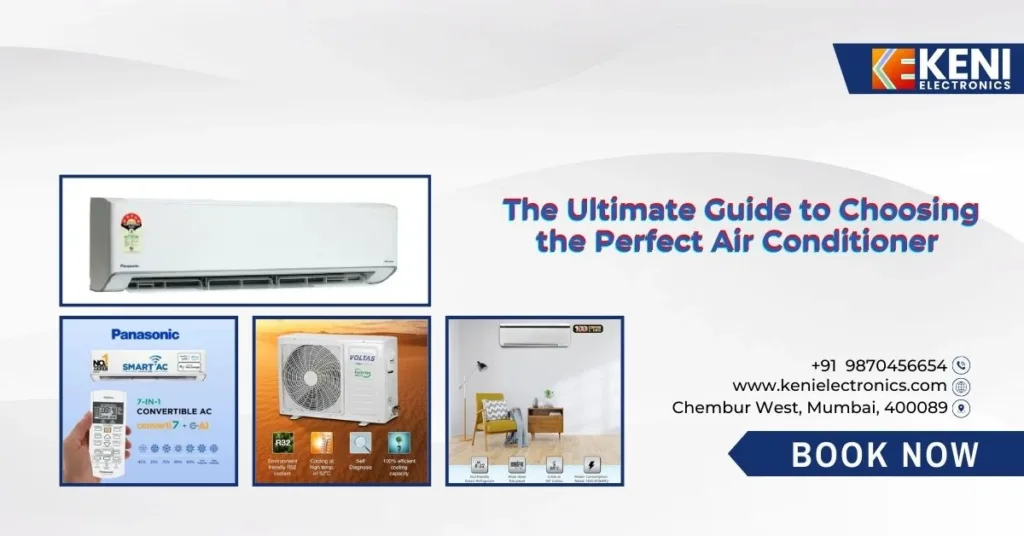
Table of Contents
Introduction:
Summer heat can be unbearable, and the right air conditioner can make all the difference in keeping your home comfortable. But with so many options out there, how do you pick the perfect one? Whether you’re upgrading an old unit or buying an Air Conditioner for the first time, choosing the best air conditioner for your home can seem overwhelming. Don’t worry! We’ve put together this comprehensive guide to help you navigate through the process and make an informed decision. Let’s dive in and find the ideal cooling solution for your space.
Why Choosing the Right AC Matters
The decision to buy an air conditioner goes beyond just finding something that cools the room. A well-chosen Air Conditioner can enhance your indoor air quality, reduce your energy bills, and provide consistent comfort throughout the year. With the market flooded with various brands, features, and types, selecting the right one requires careful thought. Choosing wisely will not only benefit your wallet in the long run but also improve your overall well-being by creating a more comfortable, healthy environment.
1. Understand Your Cooling Needs
Before you rush to the store or hit the “Buy Now” button, it’s crucial to assess your space. The size of your room will directly impact the type of Air Conditioner you should choose. For example, a 1-ton Air Conditioner is perfect for a small room (less than 120 sq.ft), while a 1.5-ton or 2-ton AC is ideal for larger rooms or open spaces.
Room Size Matters:
To calculate the right Air Conditioner size, consider both the square footage and other factors like the number of windows, sunlight exposure, and the number of people typically in the room. Too small a unit, and it’ll have to work overtime; too large, and it’ll waste energy and cost you more. You can easily find online calculators to help you determine the ideal tonnage based on your room size.
Here’s a simple breakdown:
- Up to 100 sq. ft: 0.75 – 1 Ton AC
- 100 – 150 sq. ft: 1 – 1.5 Ton AC
- 150 – 200 sq. ft: 1.5 – 2 Ton AC
- 200+ sq. ft: 2 Ton or more
2. Types of Air Conditioners: What’s Right for You?

With so many options, choosing the right type of air conditioner can be tricky. Let’s break down the most common types to make your decision easier:
Window AC:
Compact and budget-friendly, perfect for small rooms or rental properties. These units are easy to install and ideal for homes where you don’t want to spend much on installation costs. However, they tend to be noisy and are less energy-efficient compared to split or inverter models.
Split AC:
Ideal for larger rooms or homes, offering quieter operation and more efficient cooling. The outdoor unit houses the compressor, which means you get better cooling without the noise and heat buildup inside the room. If you’re looking for a long-term solution, a split Air Conditioner is a great choice.
Inverter AC:
A modern option that adjusts cooling based on demand, offering better energy efficiency and quieter operation. Inverter technology allows the compressor to run at variable speeds, which translates to less wear and tear, lower electricity consumption, and more precise temperature control.
Portable ACs:
A great temporary solution for renters or those who need flexibility, but they are less efficient compared to other types. These units are mobile and can be moved from room to room, making them an excellent choice for cooling a single room temporarily. However, they tend to be noisier and less powerful than fixed models.
Central AC:
Best for large homes, where a system can cool multiple rooms at once. Central Air Conditioners are built into the house’s HVAC system and are ideal for people who want whole-house cooling. They offer excellent efficiency but require significant installation costs and maintenance.
Pro Tip: For long-term savings and better comfort, Inverter Air Conditioners are usually the best choice, offering energy efficiency and precise temperature control.
3. Key Features to Look For: Make Your AC Work Smarter, Not Harder
When shopping for an Air Conditioner, it’s not just about the cooling power. There are several features you should consider to ensure you’re getting the best value:
Energy Efficiency:
Look for Air Conditioners with a 5-Star Energy Rating. These units use less electricity, saving you money on your monthly bills. The higher the ISEER (Indian Seasonal Energy Efficiency Ratio) rating, the better the energy savings. An Air Conditioner with a higher ISEER rating will cool your room faster, use less power, and ensure lower running costs. Over time, this can result in significant savings on your electricity bills.
Air Quality Features:
Modern Air Conditioners come with advanced filters (like PM 2.5 filters) to improve air quality by trapping dust, allergens, and other pollutants. If you have asthma or allergies, this feature is essential. Some Air Conditioners also come with anti-bacterial filters and auto-cleaning filters that further reduce the buildup of harmful bacteria, providing healthier air for you and your family.
Smart Features:
From Wi-Fi control to smart thermostats, many Air Conditioners now come with app integration. This means you can control your Air Conditioner even when you’re not at home. Whether you want to turn on the cooling before you arrive or adjust settings to optimize energy use, the ability to control your Air Conditioner via a smartphone app is a convenience you don’t want to miss.
Noise Level:
No one wants an Air Conditioner that sounds like a jet engine. Look for models with a low decibel rating (under 40 dB) for quiet operation, especially for bedrooms or home offices. Inverter Air Conditioners generally offer quieter performance due to their variable-speed compressors.
4. How to Calculate Energy Consumption and Costs
Energy efficiency is a big deal, and understanding how to calculate your Air Conditioner’s energy usage is key to keeping costs down. EER (Energy Efficiency Ratio) and SEER (Seasonal Energy Efficiency Ratio) are two important metrics to look for. A higher EER or SEER means lower energy consumption and lower bills.
To calculate the energy consumption, multiply the power (in watts) of the Air Conditioner by the number of hours it runs. This will give you the energy consumption in kilowatt-hours (kWh). Check your local energy rates to estimate the cost per hour of using the Air Conditioner.
Bonus Tip: If you’re concerned about running costs, opt for an Inverter Air Conditioner. These units adjust the compressor speed to match the cooling load, which translates to significant energy savings. Inverter technology can reduce your energy consumption by as much as 30-50% compared to traditional non-inverter models.
5. Choosing the Right Brand: Quality You Can Trust
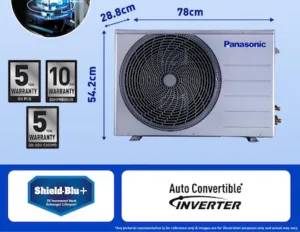
When it comes to air conditioners, the brand matters. Reliable brands like Daikin, Haier, LG, Mitsubishi, Voltas, and Samsung are known for their performance, durability, and energy efficiency. It’s worth investing in a brand that’s well-reviewed and comes with good after-sales support.
Make sure to research warranty and service support when selecting a brand. Some companies provide extended warranties and a solid after-purchase service network, which can be a lifesaver if your Air Conditioner needs repair or servicing.
Don’t forget to check online reviews for customer feedback. This can give you a good idea of how the Air Conditioner performs in real-life conditions. Also, look out for special features like extended warranties on compressors or quick service response times.
Warranty: 1 Year Comprehensive, 5 Years PCB, and 10 Years Compressor Warranty.
Keni Electronics provides you with top-quality Air Conditioners, along with excellent customer support and warranty options for a hassle-free experience. Shop with confidence!
6. Installation and Maintenance Tips: Keep Your AC Running Smoothly
After you’ve made your purchase, proper installation is key to getting the best performance out of your Air Conditioner. Always choose professional installation to avoid any issues like leaks or inefficient cooling. Improper installation can drastically reduce the efficiency of your unit.
Here are some additional maintenance tips to keep your AC running smoothly:
- Clean the filters regularly (every 1-2 months) to ensure better airflow and prevent dust buildup.
- Inspect the condenser and evaporator coils for dirt or dust. Clean them periodically to maintain efficiency.
- Check refrigerant levels annually. Low refrigerant can affect cooling performance and increase energy consumption.
- Ensure proper insulation around ducts to avoid energy loss.
- Schedule professional servicing every year to ensure everything is running efficiently and to catch any potential issues early.
7. Conclusion: Ready to Choose the Best AC for Your Home?
Choosing the right air conditioner is a long-term investment in your comfort, health, and energy savings. By considering factors like room size, energy efficiency, and smart features, you can find the perfect unit for your needs. Whether you’re after a quiet inverter Air Conditioner or a high-performance split AC, the right choice can help you stay cool and save on electricity bills.
Ready to buy your new air conditioner? Visit Keni Electronics today for the best deals and expert advice. Our team can help you find the perfect Air Conditioner for your home, whether you’re upgrading or buying your first unit.



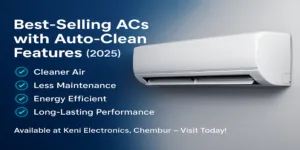

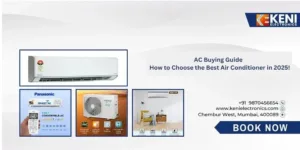

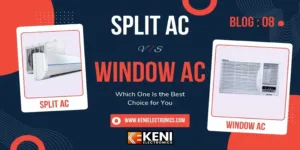
Add comment